
Insulin delivery company Insulet Corporation (NASDAQ:PODD) reported Q1 CY2025 results beating Wall Street’s revenue expectations, with sales up 28.8% year on year to $569 million. On top of that, next quarter’s revenue guidance ($608.2 million at the midpoint) was surprisingly good and 5.5% above what analysts were expecting. Its non-GAAP profit of $1.02 per share was 29.7% above analysts’ consensus estimates.
Is now the time to buy Insulet? Find out by accessing our full research report, it’s free.
Insulet (PODD) Q1 CY2025 Highlights:
- Revenue: $569 million vs analyst estimates of $543 million (28.8% year-on-year growth, 4.8% beat)
- Adjusted EPS: $1.02 vs analyst estimates of $0.79 (29.7% beat)
- Adjusted EBITDA: $133.9 million vs analyst estimates of $113.4 million (23.5% margin, 18.1% beat)
- Revenue Guidance for Q2 CY2025 is $608.2 million at the midpoint, above analyst estimates of $576.3 million
- Operating Margin: 15.6%, up from 12.9% in the same quarter last year
- Free Cash Flow Margin: 9.1%, down from 14.8% in the same quarter last year
- Constant Currency Revenue rose 29.8% year on year (22.8% in the same quarter last year)
- Market Capitalization: $18.08 billion
Company Overview
Revolutionizing diabetes care with its tubeless "Pod" technology, Insulet (NASDAQ:PODD) develops and manufactures innovative insulin delivery systems for people with diabetes, primarily through its Omnipod product line.
Sales Growth
A company’s long-term sales performance can indicate its overall quality. Any business can experience short-term success, but top-performing ones enjoy sustained growth for years. Luckily, Insulet’s sales grew at an excellent 23.1% compounded annual growth rate over the last five years. Its growth surpassed the average healthcare company and shows its offerings resonate with customers, a great starting point for our analysis.
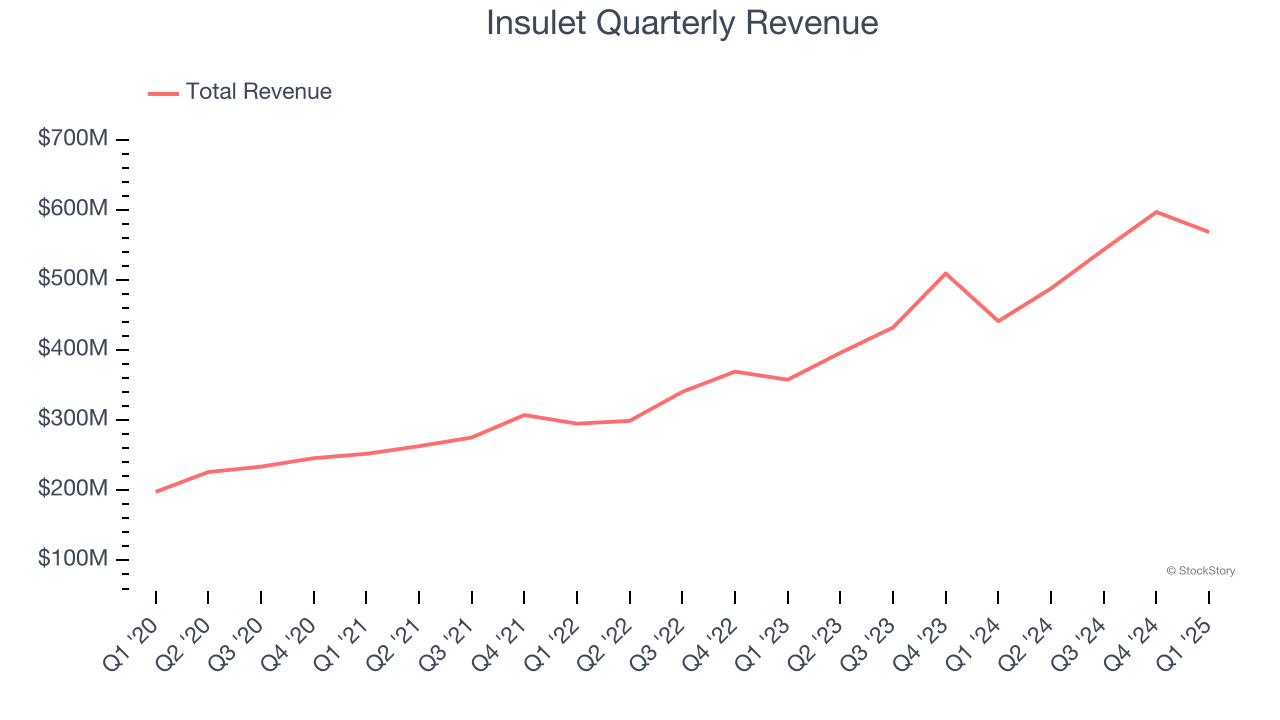
Long-term growth is the most important, but within healthcare, a half-decade historical view may miss new innovations or demand cycles. Insulet’s annualized revenue growth of 26.8% over the last two years is above its five-year trend, suggesting its demand was strong and recently accelerated. 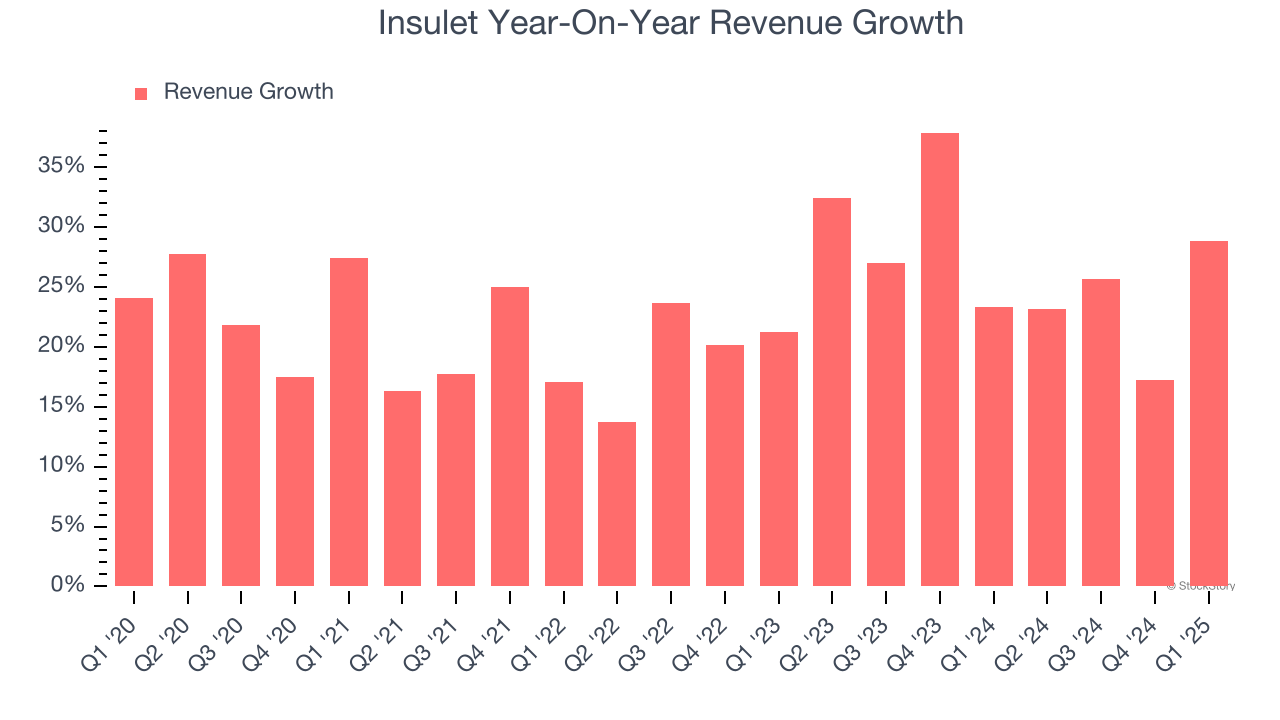
We can dig further into the company’s sales dynamics by analyzing its constant currency revenue, which excludes currency movements that are outside their control and not indicative of demand. Over the last two years, its constant currency sales averaged 26.6% year-on-year growth. Because this number aligns with its normal revenue growth, we can see that Insulet has properly hedged its foreign currency exposure. 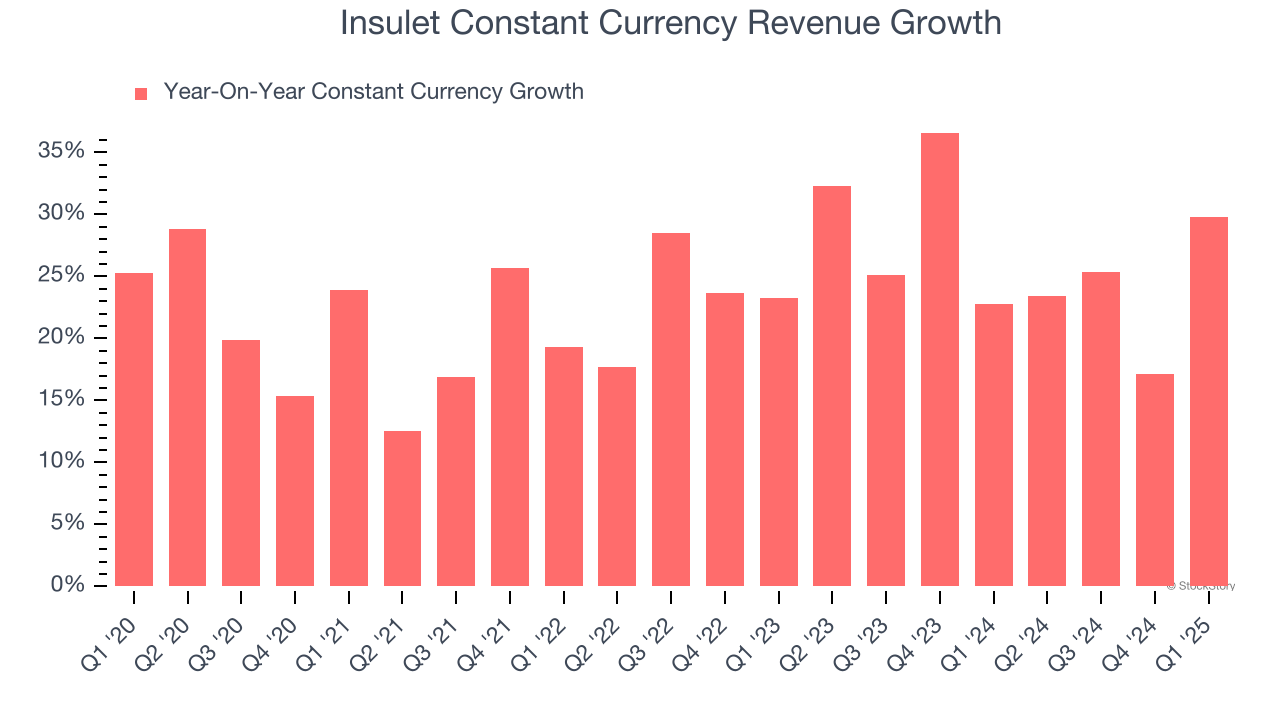
This quarter, Insulet reported robust year-on-year revenue growth of 28.8%, and its $569 million of revenue topped Wall Street estimates by 4.8%. Company management is currently guiding for a 24.5% year-on-year increase in sales next quarter.
Looking further ahead, sell-side analysts expect revenue to grow 15.8% over the next 12 months, a deceleration versus the last two years. Still, this projection is commendable and implies the market is baking in success for its products and services.
Today’s young investors won’t have read the timeless lessons in Gorilla Game: Picking Winners In High Technology because it was written more than 20 years ago when Microsoft and Apple were first establishing their supremacy. But if we apply the same principles, then enterprise software stocks leveraging their own generative AI capabilities may well be the Gorillas of the future. So, in that spirit, we are excited to present our Special Free Report on a profitable, fast-growing enterprise software stock that is already riding the automation wave and looking to catch the generative AI next.
Operating Margin
Operating margin is one of the best measures of profitability because it tells us how much money a company takes home after subtracting all core expenses, like marketing and R&D.
Insulet has done a decent job managing its cost base over the last five years. The company has produced an average operating margin of 11.1%, higher than the broader healthcare sector.
Looking at the trend in its profitability, Insulet’s operating margin rose by 9.2 percentage points over the last five years, as its sales growth gave it operating leverage. This performance was mostly driven by its recent improvements as the company’s margin has increased by 13.5 percentage points on a two-year basis. These data points are very encouraging and shows momentum is on its side.
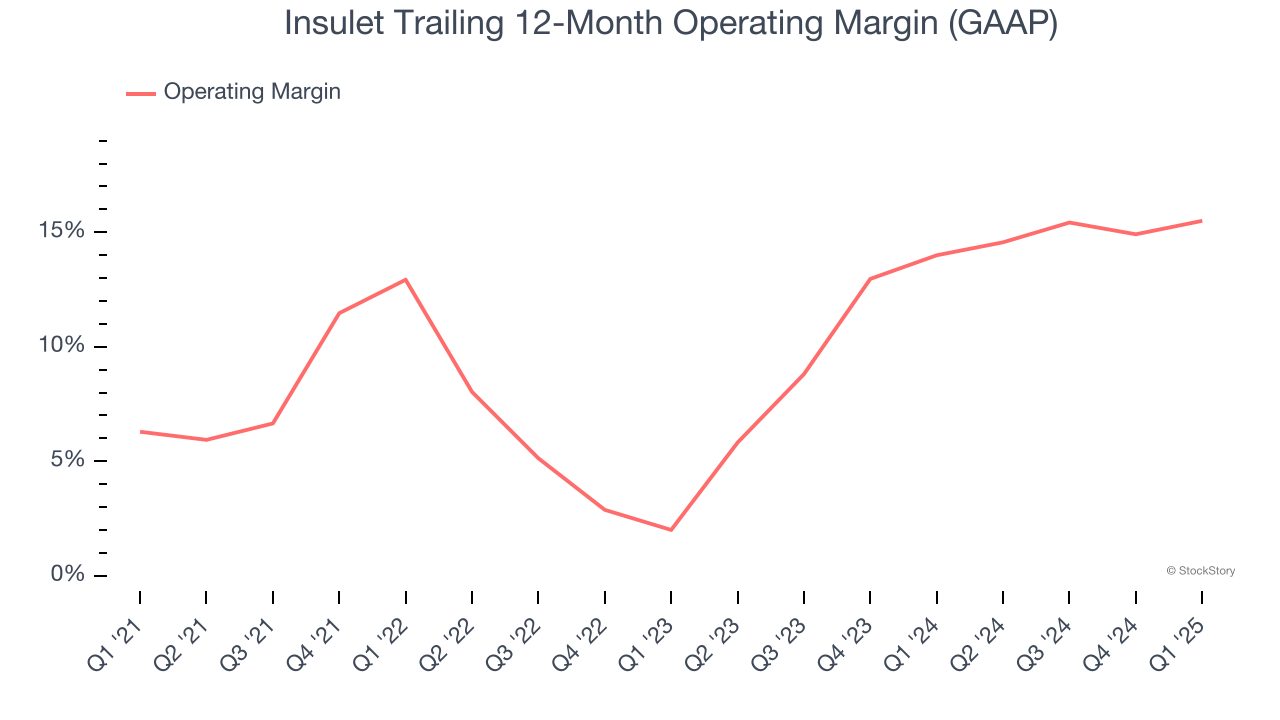
This quarter, Insulet generated an operating profit margin of 15.6%, up 2.7 percentage points year on year. This increase was a welcome development and shows it was more efficient.
Earnings Per Share
Revenue trends explain a company’s historical growth, but the long-term change in earnings per share (EPS) points to the profitability of that growth – for example, a company could inflate its sales through excessive spending on advertising and promotions.
Insulet’s EPS grew at an astounding 114% compounded annual growth rate over the last five years, higher than its 23.1% annualized revenue growth. This tells us the company became more profitable on a per-share basis as it expanded.
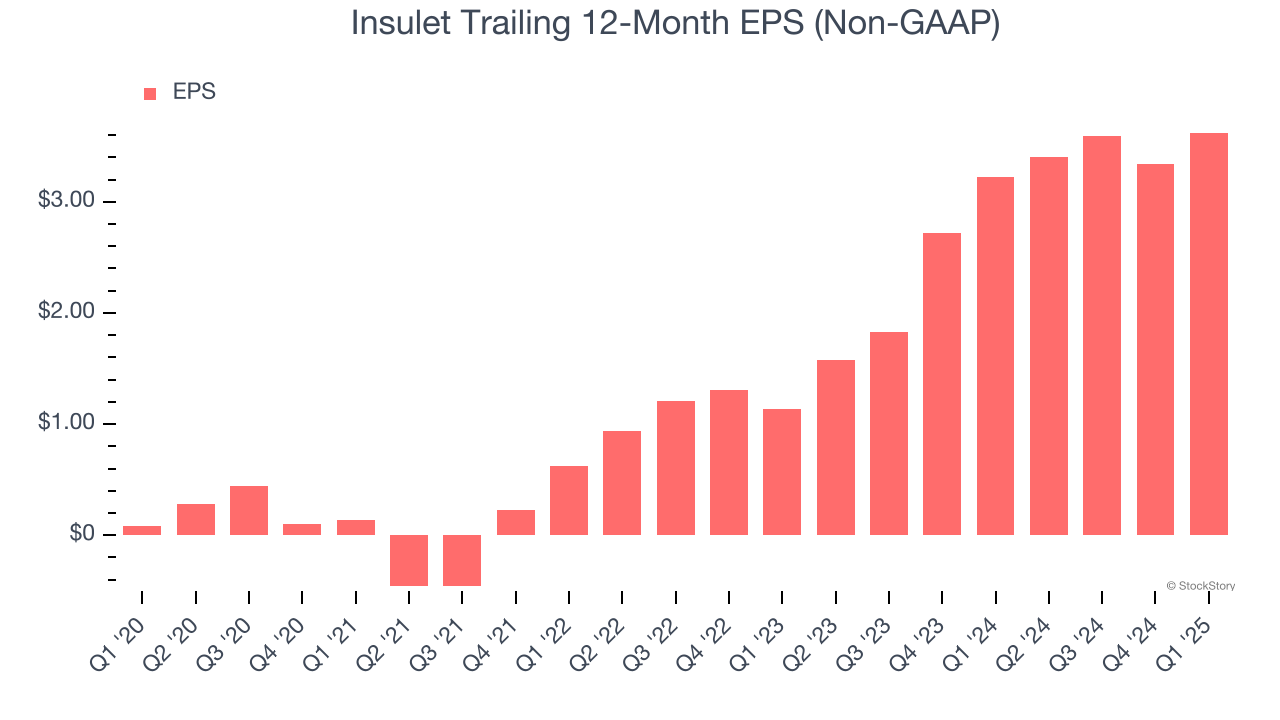
We can take a deeper look into Insulet’s earnings to better understand the drivers of its performance. As we mentioned earlier, Insulet’s operating margin expanded by 9.2 percentage points over the last five years. This was the most relevant factor (aside from the revenue impact) behind its higher earnings; taxes and interest expenses can also affect EPS but don’t tell us as much about a company’s fundamentals.
In Q1, Insulet reported EPS at $1.02, up from $0.73 in the same quarter last year. This print easily cleared analysts’ estimates, and shareholders should be content with the results. Over the next 12 months, Wall Street expects Insulet’s full-year EPS of $3.62 to grow 22.1%.
Key Takeaways from Insulet’s Q1 Results
We were impressed by how significantly Insulet blew past analysts’ constant currency revenue, EPS, and EBITDA expectations this quarter. We were also excited its quarterly revenue guidance outperformed Wall Street’s estimates. Zooming out, we think this was a solid print. The stock traded up 8.9% to $280 immediately following the results.
Insulet put up rock-solid earnings, but one quarter doesn’t necessarily make the stock a buy. Let’s see if this is a good investment. The latest quarter does matter, but not nearly as much as longer-term fundamentals and valuation, when deciding if the stock is a buy. We cover that in our actionable full research report which you can read here, it’s free.
